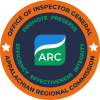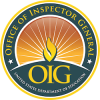
12,622
Open Recommendations
Open Recommendations
Age of Recommendations
3K Open Less Than 1 Year
6K Open Between 1-5 Years
2K Open More Than 5 Years
Date
Federal OIG
Report Title
Type: Type

Appalachian Regional Commission OIG
Southern Tier West Regional Planning and Development Board
Type:
Audit

Nuclear Regulatory Commission OIG
Audit of the Defense Nuclear Facilities Safety Board’s Review Agendas
Type:
Audit

Department of Veterans Affairs OIG
Failures Related to the Care and Discharge of a Patient and Leaders’ Response at the VA New Mexico Healthcare System in Albuquerque
Type:
Inspection / Evaluation

Department of Veterans Affairs OIG
Deficiencies in Care at the Batavia Community Living Center Contributed to a Resident’s Death at the VA Western New York Healthcare System in Buffalo
Type:
Inspection / Evaluation

Department of Justice OIG
Audit of the Office of Justice Programs Second Chance Act Grant Awarded to the Volunteers of America Northern New England, Inc.
Type:
Audit

Department of Education OIG
Federal Information Security Modernization Act of 2014 (FISMA) Audit of the U.S. Department of Education’s Information Security Program and Practices for Fiscal Year 2025
Type:
Audit

National Aeronautics and Space Administration OIG
NASA’s Standing Review Board Practices
Type:
Audit

Department of the Interior OIG
The Bureau of Indian Education Must Correct Safety and Health Deficiencies and Improve Emergency Preparedness, Security, and Facility Management System Accuracy at Riverside Indian School
Type:
Inspection / Evaluation

